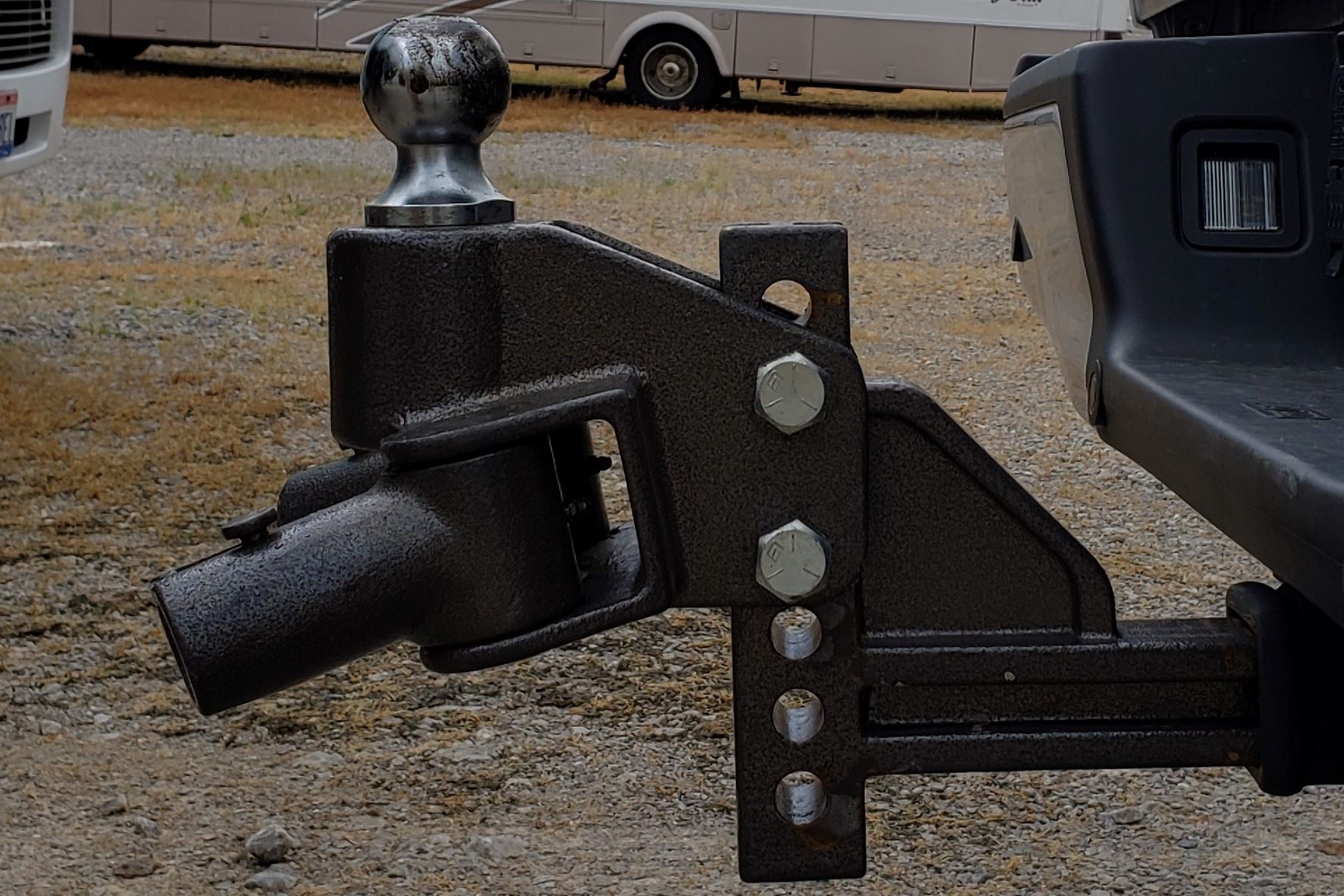Trailer hitch failure is something you hopefully never experience but always plan for. The trailer hitch bears a heavy burden while it lets you safely haul across long distances, and failure in this area leads to serious accidents.
Trailer hitches fail due to:
- Manufacturing defects or improper design
- Defective trailer tongue/couplings
- Rusted components
- Reckless driving
- Improperly sized safety chains
- Oversized cargo
- Hazardous road conditions
- Malfunctioning brakes
Keep reading as we explore the issues surrounding trailer hitch failure and who is responsible for preventing problems from worsening. We also dive into the most common reasons for trailer hitch failure and explore how you can avoid them or catch them head-on.
Trailer Hitch Failure
Trailer hitch failure is unfortunate, but it is bound to cause a serious accident. Not only does trailer hitch failure pose a threat to your towing vehicle and your trailer, but collateral damage is unavoidable for:
- Nature
- Surrounding vehicles
- Nearby structures
We rely on the trailer hitch to function correctly to pull a trailer behind your truck or another hauling vehicle. Unfortunately, we also tend to inspect this area less often, especially when compared to other vehicle parts, like tires or brakes. We assume we can back up and hook up, and that’s the end of it.
Because the trailer hitch bears the total weight of the load, it’s bound to break down over time, especially when not taken care of properly.
While there is no way to eradicate 100 percent of accidents related to trailer hitch failure, understanding the leading causes and taking appropriate action will help bring the number down.
Who is Responsible for Preventing Trailer Hitch Failure?
The burden of responsibility lies with the person hitching the trailer to the vehicle to make sure everything is connected correctly. They should ensure they do not get distracted while securing everything and double (even triple) check all the connections before moving forward.
The owner (or owners) of the trailer, the ball hitch, and the towing vehicle should understand the minimum gross vehicle weight rating (GVWR) and not allow use if the load exceeds that (although the person hitching should verify).
The owner should also make sure they stay up to date with proper maintenance and care, and they need to make sure there are no recalls related to their trailer, hitch, or vehicle.
The manufacturer is responsible for ensuring that their product meets all safety requirements and can safely handle their claims. Any items related to towing should go through rigorous tests to ensure their integrity, and the manufacturer should quickly recall any things known to cause the trailer hitch to fail.
Common Reasons Trailer Hitches Fail
Manufacturing Defects or Improper Design
A trailer hitch requires specific engineering to ensure that it can adequately handle whatever load you have to tow. This is a difficult feat for any mechanical endeavor, but it is even more challenging when the design must also accommodate:
- Easy customization (especially when adding to vehicles that do not feature one)
- Flexibility for the hitched vehicle
- Easy connection (little to no tools required)
Having that much weight resting on such a small area is difficult, and manufacturers must ensure proper quality control and testing to ensure their towing hitch can do its job.
Any manufactured item has the opportunity for defects, and this only increases with the number of steps it takes to make such an item.
Manufacturers should notify consumers of any issues, and consumers should stay up to date if there is a problem.
Broken Trailer Coupler
The coupler bears the bulk of the weight, and downward pressure and twisting friction wear it out over time. You should check this over periodically and before towing to ensure there is not even a single crack. This indicates you should replace it immediately and not risk trailer hitch failure.
Some couplers simply bolt-on, while others need to be cut off and replaced. Please make sure you check with ample time before any planned trips to make sure you can replace them without canceling your plans.
You can find high-temperature grease to avoid grinding, but some consider this more mess than it is worth.
If you’re shopping for a new coupler, check into caste tongues over stamped metal. These are thicker and stronger, and they tend to last longer with proper care.
Rusted Components
Any metal components in your towing system are at risk of rust and corrosion. This occurs as acidic substances (including and usually water) come into contact with metals, such as iron or steel. As iron particles are exposed to oxygen and moisture, they create rust.
This weakens the integrity of the components. When it rusts, the metal gives up electrons and slowly disappears over time.
Because it is actively weakening, the rusted components pose a significant threat and opportunity for trailer hitch failure.
You can prevent this by inspecting the metal components regularly and addressing any rust concerns early on. Keeping them away from unnecessary moisture is also a strong approach.
Metal components can be lubricated or covered in paint to limit exposure, but this only does so much to prevent rusting. It can also mask the problem if you cannot see signs of corrosion.
Reckless Driving
Driving improperly puts unnecessary strain on the trailer hitch, and it often leads to:
- An accident that causes the trailer hitch to fail
- Trailer hitch failure that causes an accident
- Wear and tear that shortens the lifespan of the components
Reckless driving encompasses a lot of factors, such as speeding or making dangerous turns. More intense movements rely on the stability of the trailer hitch, and they put more pressure on each component.
This can cause a spontaneous break in one of the components, and when you consider it alongside reckless behavior, the danger of the accident increases.
Even if there is not a problem at the moment, reckless driving can create issues that you overlook until later on. Someone may drive the vehicle properly afterward and end up with trailer failure due to the behavior.
The only way to avoid this is by sticking to proper towing procedures and any safety signs, laws, and recommendations.
Improperly Sized Safety Chains
Your safety chains are your last line of defense if the towing system fails. You should first check to make sure they’re in proper condition to hold up if needed. Chain links should not be bent, cracked, or rusted.
Safety chains also have their own GVWR, and yours should cover your towing load.
Many states require your safety chains to cross over once, but this is good practice regardless. If you’re using a single safety chain, make sure you run it through the tongue eye and connect it properly.
Chains should be long enough to allow the trailer to achieve the maximum turning angle. They should be short enough that they do not drag on the ground.
Ensuring all these details check out will ensure you have a solid backup plan if your trailer hitch fails.
Oversized Cargo
Your cargo should not exceed the weakest piece in your towing setup. You cannot average out ratings, and you must go with the smallest capacity when determining what you can safely tow.
It would be best if you aimed to operate at least a few hundred pounds below capacity. This gives you plenty of breathing room and does not max out the capability of your towing system.
While some people successfully tow beyond capacity, this is not something you should accept as the norm. All it takes is one instance where the hitch fails, and it can result in disaster.
Hauling oversized cargo will break down your trailer hitch faster, and you’ll need to pay out for a new one even if it does not fail mid-tow.
Hazardous Road Conditions
Hazardous road conditions commonly refer to:
- Ice
- Speed
- Snow
It’s impossible to predict vehicle movement in these conditions, especially if you’re towing a trailer or another vehicle behind you.
It’s best to avoid towing in these conditions and any weather conditions you are not entirely comfortable driving in.
Examples of lesser conditions include:
- Heavy rainfall
- High winds
- Dark or poorly lit roads
You want more ability to control while using your trailer hitch, and these conditions reduce you to less. Without perfect control, you are more likely to move erratically, and you can snap components or create minor issues that will evolve with time and pressure.
Final Thoughts
There are plenty of reasons that trailer hitches fail, ranging from manufacturing defects to improper operation.
While staying up to date with any recalls can warn you of issues ahead of time, you are your only line of defense. Making sure you maintain all components properly and on the right schedule is how you prevent problems from popping up or happening before the end of life of your tools.
Pay attention to the manufacturer’s maintenance schedules and care instructions and look for minor issues. These quickly evolve into trailer hitch failure, and finding them before you set out is key to preventing an accident.
Don’t forget to check out our Recommended RV Equipment list!
Get a FREE copy of the Go Together Go Far Travel Trailer Hookup and Disconnect Checklist when you sign up for the Go Together Go Far Newsletter!
Want to learn more about different types of RVs? Check out:
- Best Off-Road Camper Trailer Under $10,000
- Best Bunkhouse Travel Trailer Under 30 Feet
- Are Lance Travel Trailers Any Good?
- Do Rope Lights Deter Rodents?
- What Are the Best Names in the RV Industry?
- 3 Best Travel Trailers for Family of Four
- Blue Ox SwayPro Basics: Top Questions Answered
- Adding A Washer Dryer To Travel Trailer? What You Need To Know.
- Best Drone For Camping, Backpacking, and RVing: A Complete Guide to Drones for RVers
- Furniture and RVs – How To Get It Through the Door…
- How To Get Rid Of A Poop Pyramid In RV Black Tank
- Do You Know How Long To Keep Fresh Water In RV Tank Storage?
- What Is The Best Outdoor Security Camera System For Your RV?
- RV Bumper Mount Grills: 5 Best Options For Your RV Or Camper
- Best Electric Tankless Water Heater for Your RV. What You Need To Know
- Read Before You Buy! How to Find the Best Scooter for RV Camping
- 3 Best Travel Trailers for Family of Four
- Top RV Brands: What Are the Best Names in the RV Industry?
- Lance Campers: What Makes Them So Different?
- Best Bunkhouse Travel Trailer Under 30 Feet
- Best Off-Road Camper Trailer Under $10,000
- Best Weight Distribution Hitch With Sway Control For Travel Trailers in 2022
- What Are The Best Built Travel Trailers? Things To Consider.
- How Does An RV Refrigerator Work? A Quick Guide.
- Why Does My RV Carbon Monoxide Detector Keep Beeping? A Quick Guide.
- Where Is The Power Converter In My RV Or Travel Trailer
- What is the Best Generator for 50 Amp RV?
- Wireless RV Security Camera Systems: Is Solar Powered Security Without Wi-Fi An Option?
- Best Portable Air Conditioner for Camping for 2022
- How to Find the Best 3500 Watt Inverter Generator for RV Camping
- Best Propane Generator For Your RV: Read This Before You Buy!


